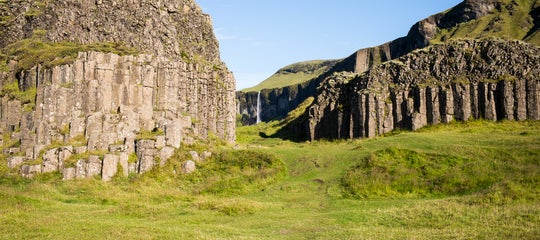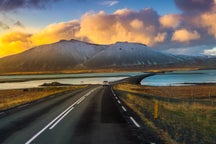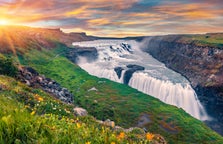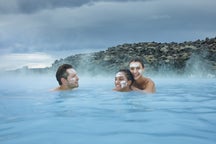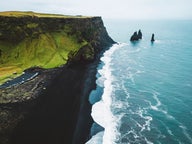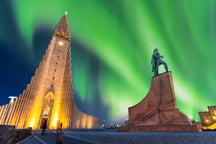Help conserve Iceland’s nature and volunteer your time. Many people say it’s the highlight of their stay in Iceland, and if you enjoy the outdoors, it’s a fantastic way to give back.
- See all you need to know about How to Move to Iceland | The Ultimate Guide
- Are you interested to know How to Find a Job in Iceland?
The largest nature-conservation program in Iceland is the Iceland Conservation Volunteers (ICV), run by The Environment Agency of Iceland. Other excellent options include the Thorsmork Trail Volunteers (coordinated by Land and Forest Iceland), Working Abroad, World Wide Friends (WF), and SEEDS. SEEDS and WF offer a wide range of short-term workcamps around the country.
Why You Can Trust Our Content
Guide to Iceland is the most trusted travel platform in Iceland, helping millions of visitors each year. All our content is written and reviewed by local experts who are deeply familiar with Iceland. You can count on us for accurate, up-to-date, and trustworthy travel advice.
Below you’ll find an overview of the Environment Agency’s volunteer program and SEEDS workcamps.
Iceland Conservation Volunteers
The ICV program supports practical conservation across Iceland’s protected areas. Trail Teams spend the summer based in national parks and nature reserves, including the highlands, improving and maintaining hiking infrastructure and restoring sensitive sites. Tasks include building and repairing boardwalks, drains, stone steps and small bridges, supporting rangers with wilderness restoration, and removing invasive plants.
ICV is a seasonal, full-time field placement. Volunteers receive training in early June before heading into the field with experienced leaders. Teams live in tents at simple field camps in some of the most beautiful and remote parts of the country, gaining hands-on conservation skills and working closely with Icelandic rangers and staff.
Applications open each winter for summer Trail Teams, with the main application window in January and February and placements running June through August. Find current dates and the application form on the volunteer page.
SEEDS workcamps
Founded in 2005, SEEDS is a non-governmental, non-profit organization that brings international volunteers together through short-term camps focused on environmental, social and cultural projects. Workcamps last 9 to 16 days and run year-round, with outdoor projects in spring and summer and educational or environmental-awareness camps in Reykjavik in autumn and winter.
Project types include building or repairing hiking paths, coastline clean-ups, reforestation and erosion control, heritage and community-building renovations, ecological research, and removing invasive growth (such as Nootka lupin). Camps bring together volunteers from many countries to live and work as a team, building practical skills, cultural understanding and a shared commitment to the environment.
Many short-term camps charge a participation fee that covers food, basic shared accommodation and local transport related to project activities. Exact inclusions vary by camp; details and availability are listed on the SEEDS website. You can read more about SEEDS here.
World Wide Friends (WF) workcamps
WF coordinates similar short-term environmental camps across Iceland throughout the year and also offers longer 3–6 month camp-leader roles. Projects range from beach clean-ups and sustainability workshops to community support and trail or forestry tasks. Food and shared accommodation are provided during camps; some programs carry a participation fee to support logistics and activities. Learn more on WF’s website.
Thorsmork Trail Volunteers
These volunteer teams focus on maintaining and restoring the iconic trail network in Thorsmork and Godaland. The season runs over spring and summer with international volunteers joining field crews based out of Langidalur. Opportunities are announced each winter on trailteam.is.
Good to know before you apply
- Eligibility and timing: Minimum age is 18. Recruitment opens in winter for spring and summer placements. Short-term workcamps also run in autumn and winter, especially in Reykjavik.
- Costs: International travel to Iceland is at your own expense. Some programs charge a participation fee that covers food, basic accommodation and local transport for camp activities. Always check the specific inclusions for your project.
- Living conditions: Expect simple, communal living. Field teams may camp for extended periods; urban camps use shared houses or community facilities. Bring a warm sleeping bag, sturdy boots and waterproof, windproof clothing (Icelandic weather changes fast).
- Visas and permits: If you are visa-exempt for the Schengen Area, you can stay up to 90 days without a visa. For longer volunteer stays or if you require a visa, a residence permit for volunteers (valid for up to one year, non-renewable) may apply; it does not grant the right to paid employment and requires health insurance. Confirm requirements for your nationality before you travel.
- Safety and stewardship: You’ll work under trained leaders with appropriate tools and safety guidance. Follow Leave No Trace principles, respect protected-area rules and listen to your team leaders and rangers at all times.
Volunteering in Iceland lets you protect fragile landscapes, meet like-minded people and see the country from the inside. If you’re ready to roll up your sleeves, apply early and pack well, Iceland will reward your effort.





